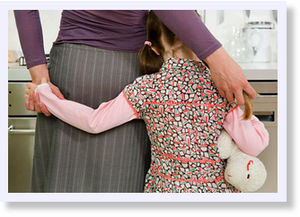Parents and Caregivers, We are thrilled to unveil our latest initiative – the Parenting ADHD…
Study Shows a Mother’s Voice Can Reduce Stress Levels in Young Girls
By Bill Hendrick, WebMD – Thursday, May 13, 2010
A kind word from mom by phone may be as good as a hug in calming the frayed nerves of frazzled daughters, a new study indicates.
In the study, which involved 61 girls aged 7 to 12, researchers say a mere phone call from their moms helped reduce the stress levels of the youngsters.
Led by biological anthropologist Leslie Seltzer, PhD, of the University of Wisconsin-Madison, the research team set out to measure fluctuations of the stress hormone cortisol, as well as of the “comfort” or “cuddle” hormone oxytocin.
The girls, all volunteers, were suddenly placed in stressful situations. They were asked without warning to deliver a speech in front of a group of strangers, an exercise that can create stress in people of any age.
Then they were drilled with difficult math questions — also in front of an audience. As expected, cortisol levels, known to increase with stress, skyrocketed when measured in saliva soon after the stressful situation.
Seltzer and Seth Pollak, PhD, a psychology professor at University of Wisconsin, Madison, then divided the girls into three groups.
The mothers of one group were on hand to hug and offer physical comfort to their daughters. Other girls were handed a telephone, with mom on the line. A third group watched an emotionally neutral film called March of the Penguins.
Researchers say the calming effect on the girls who were comforted by a hug or physical touch was more immediate, but that the stress hormone levels also quickly dropped in those who received soothing words from their mothers by phone.
For the girls who watched the film, cortisol levels were still considerably above normal an hour after their stressful experiences. Similarly, levels of the “cuddle hormone” oxytocin went up in girls who were hugged as well as those who received comforting phone calls, though not quite as fast in those whose mothers were not physically present.
Oxytocin levels were flat or low in the girls who watched the movie. The hormone levels were tested in samples of urine collected at various times during the course of the experiment.
“It was [previously] understood that oxytocin release in the context of social bonding usually required physical contact,” Seltzer says in a news release. “But it’s clear from these results that a mother’s voice can have the same effect as a hug, even if she’s not standing there.”
The relief from anxiety lasts, Pollak says. “By the time the children go home, they’re still enjoying the benefits of this relief and their cortisol levels are still low,” he says in the news release.
Gender Differences in Reacting to Stress
The findings are published in the journal Proceedings of the Royal Society B, and they square with a “tend and befriend” theory, explaining how stress regulation may differ between females and males.
Males, when confronted with a threat, may be more likely to choose between fight or flight. But females with offspring in tow, or slowed by pregnancy, may have evolved to make different choices.
“You might not be able to run with a child or defend yourself without endangering both of you,” Seltzer says. She adds that it might make more sense for a female to create or use a social bond to deal with a stressor, either through touch or soothing communication.
“Apparently, this hormone oxytocin reduces stress in females after both types of contact, and in doing so may strengthen bonds between individuals,” Seltzer says.
Seltzer tells WebMD in an email that stress effects on boys were not addressed in this study, but experiments on young guys are under way. “The results aren’t all in, but yes, boys do look different. So do girls who interact with dad instead of mom.”
So would a hug from a dad, or a soothing phone call, do any good for children of either gender? “We just don’t know,” Pollak tells WebMD in an email. “But hormone systems between males and females may also be different. This was the very first study of its kind using the voice.”
Seltzer says her team “chose to focus on girls for this particular study because the hormone oxytocin, which we think helps regulate social behavior, is typically studied in females because of its role in maternal-infant attachment.”
She adds that “male children are equally interesting in their own right and will be the subjects of future work.”
In addition to reducing stress, oxytocin also may strengthen bonds between people, Seltzer says.
“For years,” Pollak says, “I’ve seen students leaving exams and the first thing they do is pull out their cell phone and make a call. I used to think, ‘How could those over-attentive, helicopter parents encourage that?’ But now? Maybe it’s a quick and dirty way to feel better.”
The fact that “a simple telephone call” could raise oxytocin levels “is really exciting,” he adds.
Seltzer is testing whether other methods of communication, such as text messaging, could have the same calming effect as a phone call or hug.
“On the one hand, we’re curious to see if this effect is unique to humans,” she says in the news release. “On the other, we’re hoping researchers who study vocal communication will consider looking at oxytocin release in other animals and applying it to broader questions of social behavior and evolutionary biology.”


Hi Sally,
Saw your PCI Connection post and I will check out the book. I also checked out your website and blog and it is wonderful! Great job and great job on your blog!
Warmly,
Lori Jo Kemper
PCI Certified Parenting Coach Minneapolis
Hi Lori,
Thank you for the kind words. I would love your input on this book so I hope you can join us.
Take care,
Sally